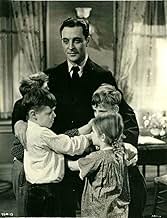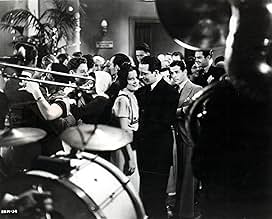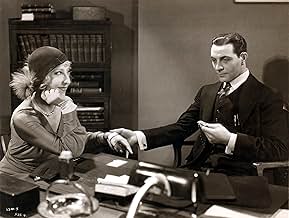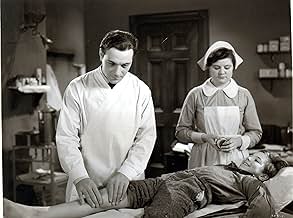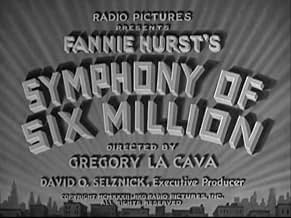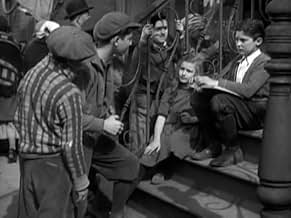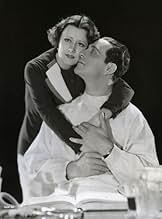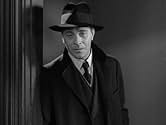Füge eine Handlung in deiner Sprache hinzuA boy grows up to become a successful doctor at the expense of family relationships.A boy grows up to become a successful doctor at the expense of family relationships.A boy grows up to become a successful doctor at the expense of family relationships.
- Auszeichnungen
- 2 wins total
Maurice Black
- Felix's Patient
- (Nicht genannt)
Jesse De Vorska
- Mr. Horowitz - Hospital Patient
- (Nicht genannt)
Harold Goodwin
- Intern at Hospital
- (Nicht genannt)
Dorothy Gray
- Jessica - as a Girl
- (Nicht genannt)
Julia Griffith
- Guest at Redemption Ceremony
- (Nicht genannt)
Harry Holman
- Mr. Holman - Hospital Patient
- (Nicht genannt)
Empfohlene Bewertungen
The story is nice, the theme pleasant (money isn't everything), but the outstanding element is the Jewish working-class background of a non-orthodox family. Not claustrophobic like the Jazz Singer and other self-pitying films, this film has an open and sunny attitude that makes it very accessible. Excellent, warm portrayals by Gregory Ratoff and Anna Appel as the stereotypical parents.
Like a good soup, there are many elements to this movie. You first have to start with a good stock. The stock in this movie is the Lower East Side of New York in the 30's. The hustle and bustle, the rag pickers, the pushcarts, the tailors, the fishmongers. The whole flavor of life in the Jewish ghetto. Without this backdrop the movie would fall flat.
Next are the ingredients. The cast in this movie is genuine and almost flawless. Gregory Ratoff as the father, Ricardo Cortez (Jacob Krantz) as his son - the doctor, and Noel Madison as the ambitious brother. They are all authentic and they are all Jewish. I said almost flawless because there is one flaw. Irene Dunne is cast as the love interest. She is a good actress, but she is clearly a shiksa in looks, speech, and mannerism. She stood out like a pork chop amongst the knishes and kugels.
Finally, none of this would matter if somebody didn't know how to cook. The story isn't original - as a matter of fact it is still being done today. A young boy grows up in poverty. A poor but nourishing neighborhood. He is part of a loving family which supports him in his quest to become a doctor. He succeeds and decides to devote his life to helping the underclass in the ghetto. His brother, meanwhile, becomes a successful businessman and convinces him that he should move "uptown" in order to make more money and help the family. He moves up the social ladder, becomes a raging success, and is celebrated by the rich and famous. Through a series of tragedies it becomes clear to him that he has lost his roots. It is only here,at the very end, that we have to give the director (probably at the direction of the producer David O. Selznick) a little melodramatic license. This movie was made in 1932 and drama was the order of the day.
You want subtle - watch something else. You want to choke up and feel good. Watch this.
Note: Although it was entirely unintentional, and could not have been imagined, there is an uncanny connection between the title of this movie and the holocaust which came to light a decade later. Six Million.
Next are the ingredients. The cast in this movie is genuine and almost flawless. Gregory Ratoff as the father, Ricardo Cortez (Jacob Krantz) as his son - the doctor, and Noel Madison as the ambitious brother. They are all authentic and they are all Jewish. I said almost flawless because there is one flaw. Irene Dunne is cast as the love interest. She is a good actress, but she is clearly a shiksa in looks, speech, and mannerism. She stood out like a pork chop amongst the knishes and kugels.
Finally, none of this would matter if somebody didn't know how to cook. The story isn't original - as a matter of fact it is still being done today. A young boy grows up in poverty. A poor but nourishing neighborhood. He is part of a loving family which supports him in his quest to become a doctor. He succeeds and decides to devote his life to helping the underclass in the ghetto. His brother, meanwhile, becomes a successful businessman and convinces him that he should move "uptown" in order to make more money and help the family. He moves up the social ladder, becomes a raging success, and is celebrated by the rich and famous. Through a series of tragedies it becomes clear to him that he has lost his roots. It is only here,at the very end, that we have to give the director (probably at the direction of the producer David O. Selznick) a little melodramatic license. This movie was made in 1932 and drama was the order of the day.
You want subtle - watch something else. You want to choke up and feel good. Watch this.
Note: Although it was entirely unintentional, and could not have been imagined, there is an uncanny connection between the title of this movie and the holocaust which came to light a decade later. Six Million.
A previous viewer commented that there isn't anything "Pre-Code" about "Symphony of Six Million." Ohhhh, yes there is - the frank and loving embrace of Jews and Jewishness, especially the familial bonds of aspiration, hope and love so strong and heart-rending that conflict and guilt are its inevitable by-products.
Such an overtly Jewish photo play wouldn't have been acceptable in the Hollywood of just a few years later. No one would come right out and say so, but the likely reason was the sensibilities of the newly militant Catholic audience, then being stirred up by the likes of Father Charles Coughlin's anti-Semitic radio talks. Also to be catered to were the quieter prejudices of Middle Western Protestants, for whom Will Hays stood in as proxy on the Code committee.
The story being pretty boilerplate, the charm of this film is all in the atmosphere, which is laid on pretty thickly. Crucial to this are able supporting players, especially Gregory Ratoff and Anna Appel as Papa and Mama Klauber. Ricardo Cortez is a bit stiff as the conflicted, noble Felix, but his swarthy, polished earnestness hits just the right note for the well-to-do My-Son-The-Park-Avenue-Doctor, 1932 edition. Irene Dunne as Jessica, Felix's crippled love interest, is lovable mostly for being Irene Dunne, whose refined features and diction don't gibe at all with her role as a ghetto girl. It says a lot about the men who once ran the movies that an obviously Jewish romantic female lead was something they couldn't, or wouldn't, portray. Authentic Jewish womanhood was still inseparable from the family matriarch, played with affecting melodrama by Appel.
TCM's Robert Osborne pointed out that "Symphony" was one of the first talkies with a full original score. At David Selznick's behest, Max Steiner wrote nearly continuous music for the film. It's heavy going at times: Felix's inner drama is too often greeted by heroic heralds of brass, and the lugubrious harmonic-minor strings accompanying Irene Dunne's entrances are like a nice glass Schmalz poured over a sumptuous Sunday chicken dinner.
Such an overtly Jewish photo play wouldn't have been acceptable in the Hollywood of just a few years later. No one would come right out and say so, but the likely reason was the sensibilities of the newly militant Catholic audience, then being stirred up by the likes of Father Charles Coughlin's anti-Semitic radio talks. Also to be catered to were the quieter prejudices of Middle Western Protestants, for whom Will Hays stood in as proxy on the Code committee.
The story being pretty boilerplate, the charm of this film is all in the atmosphere, which is laid on pretty thickly. Crucial to this are able supporting players, especially Gregory Ratoff and Anna Appel as Papa and Mama Klauber. Ricardo Cortez is a bit stiff as the conflicted, noble Felix, but his swarthy, polished earnestness hits just the right note for the well-to-do My-Son-The-Park-Avenue-Doctor, 1932 edition. Irene Dunne as Jessica, Felix's crippled love interest, is lovable mostly for being Irene Dunne, whose refined features and diction don't gibe at all with her role as a ghetto girl. It says a lot about the men who once ran the movies that an obviously Jewish romantic female lead was something they couldn't, or wouldn't, portray. Authentic Jewish womanhood was still inseparable from the family matriarch, played with affecting melodrama by Appel.
TCM's Robert Osborne pointed out that "Symphony" was one of the first talkies with a full original score. At David Selznick's behest, Max Steiner wrote nearly continuous music for the film. It's heavy going at times: Felix's inner drama is too often greeted by heroic heralds of brass, and the lugubrious harmonic-minor strings accompanying Irene Dunne's entrances are like a nice glass Schmalz poured over a sumptuous Sunday chicken dinner.
If I were picking a list of films for a Jewish film festival, Symphony Of Six Million would be right at the top of my list. Gregory LaCava directed it and with a rather florid style that probably would not go over with today's audience. Still it is quite a picture of the Jewish experience in America during the Depression years.
Ricardo Cortez stars here as an idealistic young kid who seeing the disease and poverty around him in the Lower East Side neighborhood he comes from works and studies hard to become a doctor. Cortez indeed becomes a doctor and opens a clinic in the old neighborhood.
But as his family sees it, he's too good for that. His brother Noel Madison persuades him to move uptown and start gathering a rich patient list in order that the entire family can move out and their parents Anna Appel and Gregory Ratoff can now take it easy.
Soon enough though Cortez forgets why he became a doctor with all the acclaim he now receives and the big money he commands. In the end he faces crises involving the health of two loved ones. He fails one and saves the other and possibly saves his soul as well.
One thing LaCava did was capture the Lower East Side of New York Jewish neighborhood. Appel and Ratoff were both veterans of the Yiddish theater and they really carry their parts off well. Cortez was also Jewish in real life, real name Jacob Kranz. He only got that name because he got his start playing Rudolph Valentino knockoff parts on the silent screen.
Irene Dunne is Cortez's co-star and she has little to do here as the girl who loves him since childhood. The film totally focuses around Cortez and his family dynamic.
Too melodramatic for today's audience, still Symphony For Six Million is a great picture of Jewish life in America in the not too distant past.
Ricardo Cortez stars here as an idealistic young kid who seeing the disease and poverty around him in the Lower East Side neighborhood he comes from works and studies hard to become a doctor. Cortez indeed becomes a doctor and opens a clinic in the old neighborhood.
But as his family sees it, he's too good for that. His brother Noel Madison persuades him to move uptown and start gathering a rich patient list in order that the entire family can move out and their parents Anna Appel and Gregory Ratoff can now take it easy.
Soon enough though Cortez forgets why he became a doctor with all the acclaim he now receives and the big money he commands. In the end he faces crises involving the health of two loved ones. He fails one and saves the other and possibly saves his soul as well.
One thing LaCava did was capture the Lower East Side of New York Jewish neighborhood. Appel and Ratoff were both veterans of the Yiddish theater and they really carry their parts off well. Cortez was also Jewish in real life, real name Jacob Kranz. He only got that name because he got his start playing Rudolph Valentino knockoff parts on the silent screen.
Irene Dunne is Cortez's co-star and she has little to do here as the girl who loves him since childhood. The film totally focuses around Cortez and his family dynamic.
Too melodramatic for today's audience, still Symphony For Six Million is a great picture of Jewish life in America in the not too distant past.
... and Dr. Felix Klauber (Ricardo Cortez as the adult Felix) always seems to have the best intentions. The movie starts out showing Felix as a child studying on the doorstep of his family's ghetto tenement house, taking time to defend a local girl with a curved spine (Irene Dunne as Jessica) from some taunting street bullies. The movie spends a good deal of time focusing on Felix' home environment as a child. We learn that his parents are immigrant Jews, that his father has a kind heart but a bit of a temper, that his brother can be a trouble maker but only in the way that most boys can be, and that his mother is everything you'd want a mom to be. In other words, Felix lives surrounded by misery and poverty, but his own family is doing alright and he has a very good home. Felix is very thoughtful and decides the best way he can alleviate the misery of the poor is to become a doctor and treat everyone, regardless of ability to pay.
Unlike most childhood dreams, Felix works hard and makes his a reality. As a doctor he treats people both at his home - he still lives in the ghetto with his family - and at a local clinic set up for such work. Everybody is happy - except Felix' brother Magnus. Magnus has become a businessman, thinks everything should be for sale, and that includes medicine. He's unhappy that Felix still lives with his parents in the ghetto when he could set up a nice practice in the wealthier part of the city. Knowing his brother could care less what he thinks, he convinces their mother to beg Felix to go uptown based on the fact that their father is getting old and needs to retire. It works.
The next thing we see is Felix treating socialite women whose only problem is that they are bored and overweight, although he does get paid handsomely for it. Now everyone in the Klauber household is again happy - except Felix who realizes his talents are being wasted but just can't seem to break away from the ties that bind him to his new existence. He no longer even has time to spend with the family he did all of this for in the first place. How will all of this come out? I'll let you watch and find out.
The ending was a bit too melodramatic, but overall it was a pretty satisfying film. Another reviewer mentioned the one unusual precode element of this film - the detailed portrayal of a Jewish religious ceremony being performed towards the end of the film on Birdie's new born baby - Birdie was Felix' sister. The production code which began being enforced in 1934 only allowed Christian rituals to be shown. Another unusual element of the film - Jessica as Felix' love interest although she has a noticeably curved spine. Jessica teaches blind children and acts as Felix' link to his past and his once virtuous goals. It's almost like in the cartoons when you see a character with an angel on one shoulder whispering in one ear and a devil in the other. Jessica plays the part of the angel here, Magnus is the devil - however he's a smart enough devil to always send his mother as his mouthpiece. Who would say no to mom?
Unlike most childhood dreams, Felix works hard and makes his a reality. As a doctor he treats people both at his home - he still lives in the ghetto with his family - and at a local clinic set up for such work. Everybody is happy - except Felix' brother Magnus. Magnus has become a businessman, thinks everything should be for sale, and that includes medicine. He's unhappy that Felix still lives with his parents in the ghetto when he could set up a nice practice in the wealthier part of the city. Knowing his brother could care less what he thinks, he convinces their mother to beg Felix to go uptown based on the fact that their father is getting old and needs to retire. It works.
The next thing we see is Felix treating socialite women whose only problem is that they are bored and overweight, although he does get paid handsomely for it. Now everyone in the Klauber household is again happy - except Felix who realizes his talents are being wasted but just can't seem to break away from the ties that bind him to his new existence. He no longer even has time to spend with the family he did all of this for in the first place. How will all of this come out? I'll let you watch and find out.
The ending was a bit too melodramatic, but overall it was a pretty satisfying film. Another reviewer mentioned the one unusual precode element of this film - the detailed portrayal of a Jewish religious ceremony being performed towards the end of the film on Birdie's new born baby - Birdie was Felix' sister. The production code which began being enforced in 1934 only allowed Christian rituals to be shown. Another unusual element of the film - Jessica as Felix' love interest although she has a noticeably curved spine. Jessica teaches blind children and acts as Felix' link to his past and his once virtuous goals. It's almost like in the cartoons when you see a character with an angel on one shoulder whispering in one ear and a devil in the other. Jessica plays the part of the angel here, Magnus is the devil - however he's a smart enough devil to always send his mother as his mouthpiece. Who would say no to mom?
Wusstest du schon
- WissenswertesAfter David O. Selznick became RKO's head of production in late 1931, he put the melodrama Symphony of Six Million (1932) (originally titled "Night Bell" after the Fannie Hurst story it is based on) into production, overseen by Pandro S. Berman. Selznick insisted that the original screenplay be rewritten to reclaim the ethnic touches from Hurst's story. Selznick likely wanted the film to serve as a mirror on to Jewish life, both of immigrants and their assimilated children. He himself changed the name of the film (a reference to New York City's population) as it was "more dramatic and dignified" than Night Bell. He also directed RKO music department chief Max Steiner to use symphonic music for the score and to have music throughout the picture. This was innovative as "talkies" rarely had an extensive score.
- PatzerAs is often the case when showing a devout Jewish home, a menorah, the traditional candelabrum, is displayed. However, this is used only once a year, so for the rest of the year it is put away. Having it on show is like having a Christmas tree up all year round to show that the family are Christians.
- Zitate
Dr. Schifflen: My boy, there are two kinds of men in our profession. Some are gifted with the spark of genius; some of us are... just doctors.
[walks to the door and opens it, then turns back toward Felix]
Dr. Schifflen: Felix Klauber, you're more capable than I, but if you don't go through with this operation, I will.
- VerbindungenFeatured in David O. Selznick: 'Your New Producer' (1935)
Top-Auswahl
Melde dich zum Bewerten an und greife auf die Watchlist für personalisierte Empfehlungen zu.
Details
- Erscheinungsdatum
- Herkunftsland
- Sprachen
- Auch bekannt als
- Fanny Hurst's Symphony for Six Million
- Drehorte
- Coney Island, Brooklyn, New York City, New York, USA(amusement park)
- Produktionsfirma
- Weitere beteiligte Unternehmen bei IMDbPro anzeigen
Box Office
- Budget
- 270.000 $ (geschätzt)
- Laufzeit
- 1 Std. 34 Min.(94 min)
- Farbe
- Seitenverhältnis
- 1.37 : 1
Zu dieser Seite beitragen
Bearbeitung vorschlagen oder fehlenden Inhalt hinzufügen

